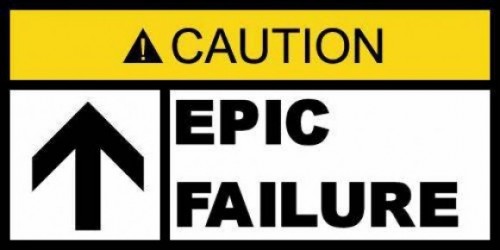
A. Failure has a strongly positive role… it can help us learn more about ourselves.
John Maxwell in Failing Forward, lists several common reasons for failure:
- Poor people skills. (#1 Cause) It’s about relationships.
- Negative attitude. Pessimistic, half empty. Can’t see opportunities… only sees problems.
- Bad fit. Find what you are made to do. I remember, years ago, a competition on TV where athletes from different specialties went head-to-head in certain sports or exercises. It was amazing how specialization can affect performance in areas of non-specialty. For example, the boxers were absolutely horrible in distance running. But to be fair, a gymnast would likely be horrible in boxing. The list could go on. Finding one’s proper fit is a lifelong journey with many missteps.
- Lack of Focus. Mental wandering. Poor planning. Not keeping eyes on the prize.
- Weak commitment. Quick to quit
- Unwillingness to change. Change is Good.
- Short-cut Mindset. It takes time. I had a boss who described a problem in business… the “Al Yagoda Syndrome”. The term comes from its symptom where a person likes to say “Al Yagoda do is…”. For those uncomfortable with American slang English… the problem is people who think and say “All you have to do is…” this or that. Even simple things are not simple. Maybe there are short-cuts in life… but you need to do things the hard way for a long time to learn where the real short-cuts are. There is a lot of truth to the old saying, “The devil is in the details.”
- Relying on talent alone. Child prodigies typically become adult mediocrities. 90% of geniuses are underachievers.
- Response to poor information. Douglas MacArthur noted, “Expect only 5% of an intelligence report to be accurate. The trick of a good commander is to isolate the 5%.”
- No Goals. If you don’t know where you are going, you can always get there. Joe Griffith says, “A goal is nothing more than a dream with a time limit.”
If we are ready to learn from problems, we will learn more about ourselves and gain a sense of direction for our own self-development.
B. The response to a failure is often more important than the failure itself.
TQM (Total Quality Management) says that one should seek to “delight the customer.” This is different from the old teaching that the goal was “customer satisfaction.” Why? Because customers EXPECT to be satisfied. If they are satisfied… so what? This is like Jesus talking about the servants who JUST do their jobs. Luke 17:10 “So you also, when you have done everything you were told to do, should say, `We are unworthy servants; we have only done our duty.” Who cares? Doing their job is the baseline.
So what happens when there is a failure. I recall over 20 years ago I bought a computer system from a store (a CompuAdd 286SX… this will give some an idea of how long ago that was). I brought it home and set it up and the monitor was VERY dim. I could see things but just barely. I was shy about taking it back. I had a busy job that gave me little free time. I thought (foolishly) that if I play with the computer settings or knobs on the monitor, the monitor would magically start working. Eventually I decided to take it back. I expected to have to write a long report and try to convince them that I did not cause the problem. I took it in. They immediately took it and said, “We would be very happy to replace it. I am sorry that we don’t have an exact replacement in the store at this moment. Would it be okay if we give you this other monitor as an exchange?” That “other monitor” was a better quality, more expensive version, and they were willing to swap it at no cost. You know, I walked away a “delighted customer.” Failure is often an opportunity to delight others. Our response to failure often says more about our character to others than moments of “victory.”
In missions, I have made a lot of mistakes. Happily, my main mentor did not mind that I made mistakes (he WOULD mind if I kept making the same mistakes). Rather, he wanted to know that I had taken care of the mistake. I personally get very nervous when I talk to people who never make mistakes. Either they are making things up, or are selectively choosing what to relate. Neither one breeds confidence for partnership.
C. Good missions requires the “normalization” of failure. This sounds bad… but periodic failure is the normal, healthy outcome of taking risks. Nice poem:
To laugh is to appear the fool
To weep is to risk appearing sentimental.
To reach out for another is to risk involvement.
To expose feelings is to risk exposing your true self.
To place your ideas, your dreams, before the crowd is to risk their loss.
To love is to risk not being loved in return.
To live is to risk dying.
To hope is to risk despair.
To try is to risk failu
But risks must be taken, because the greatest hazard in life is to risk nothin
The person who risks nothing, does nothing, has nothing, and is nothing
He may avoid suffering and sorrow
But he simply cannot learn, feel, change, grow, love and liv
Chained by his certitudes, he is a slave
He has forfeited freedom
Only a person who risks is free!
-Anonymous, Quoted in “Family is Still a Good Idea”, H. Norman Wright
In missions, risk is needed, so accepting failure as a normal TEMPORARY outcome is good.
D. So… Risk, Fail, Correct, Learn, Grow, and Risk some more. This is should be a lifelong process.
Related articles
- Why Success Always Starts with Failure (newscci.wordpress.com)
